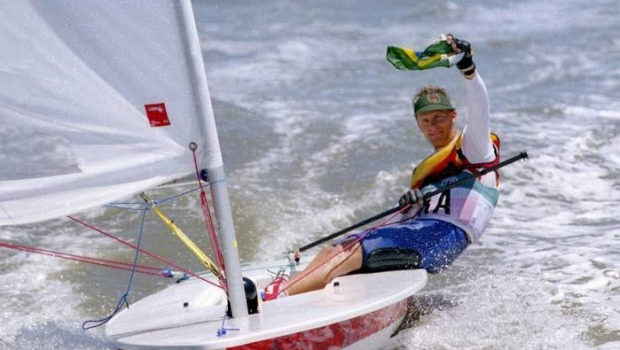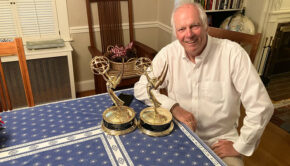Olympic History: Atlanta, Scheidt, and Ainslie
Published on July 7th, 2016
by Fi Edwards, World Sailing
Ask an Atlanta local when to come visit and chances are the end of July won’t be first choice. Weather conditions during the last two weeks of the month can be notoriously brutal, and the summer of the 1996 Olympic Games was no exception.
During the day the mercury regularly climbed to 95° or 104° F (35° or 40° C) and came accompanied by fearsome storm-heralding humidity of 89%. The opening ceremony at the sailing venue in Savannah, over 300 miles (500km) from Atlanta, had to be called off after an hour as the thunder raged. The competition on the waters of the Wassaw Sound would be as intense as the weather.
Despite the storms, around 1000 spectators a day came out to the course, looking for a show, and sailing delivered in spectacular style thanks, in part, to the rivalry between two young Laser sailors, Robert Scheidt (BRA) and Ben Ainslie (GBR).
Scheidt was at the top of his game, Ainslie a rising star. The pair had battled each other throughout the week, sharing five race wins out of ten. Heading into the 11th and final Laser race, Scheidt held a two-point lead over his rival. As long as Ainslie didn’t finish three places in front of him gold was secure.
On the water, tension was high. The first attempt at a start for the Laser fleet resulted in a general recall as boats jostled for position. The second ended the same way. Time was creeping on, so as the four-minute gun went for the third time the race committee hoisted a visual signal that brings an ominous feeling to any startline; the black flag.
The black flag makes sailors twitchy because it signals the switching on of Rule 30.3: instant disqualification for any boat over the line after the one-minute signal even if the race is restarted, resailed, or rescheduled. The raising of the black flag might have indicated to other competitors that it was time to plan for a more conservative start, but for Scheidt it would signal a golden opportunity.
Sailing’s scoring system in Savannah dictated that 11 races would be sailed and each boat’s best nine results would be counted. Scheidt’s discards were better than Ainslie’s, so to count one would still deliver the Brazilian the gold medal where, counting his own better result, Ainslie would have to settle for silver. Trusting to the outcome of the race was not a risk that Scheidt would have to take if he could push his teenage rival over the line in the final minute.
It couldn’t and wouldn’t be a case of ‘if’ but ‘when’. Scheidt’s masterful boat handling was already legendary in the Laser fleet but it would be on this start that it would be demonstrated to full effect. The Brazilian was comfortable; feeling the pressure but able to stand it, while Ainslie was on a high and brimming with anticipation and nervous energy.
With brutal efficiency Scheidt, finessed the impatient British teenager over the line. Ainslie could only watch as the race went on without them, battle denied and his gold medal hopes gone. Robert Scheidt had won Olympic gold.
Scheidt’s first gold in Atlanta would be joined by another gold (Laser), two silver (Laser and Star), and one bronze (Star) as well as 12 world titles. Most athletes might look at a career like that and call it job done but Robert Scheidt is not most athletes. The Brazilian Laser legend’s attitude and drive have kept him at the top of the sport for more than two decades.
This year, twenty years after winning his first gold in Savannah, Robert Scheidt will line up on the Laser start in Rio de Janeiro. In body, he might be 43 years, but in soul he will be 23 again. Driving him is a dream, a dream to take a medal on Guanabara Bay in front of home crowds. A final accolade to complete the impressive tally which makes him Brazil’s all-time greatest Olympic athlete.








 We’ll keep your information safe.
We’ll keep your information safe.